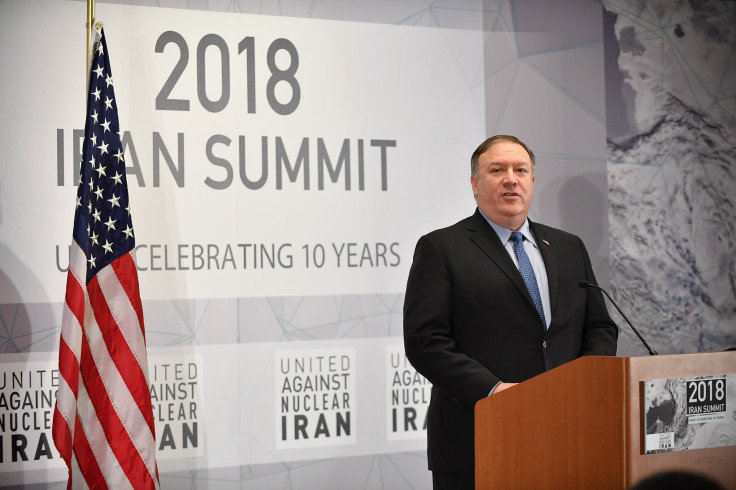Iran Prepares Satellite Launch, Ignoring US Warnings, Says It's For Peaceful Purposes

Despite recent warnings from U.S. Secretary of State Mike Pompeo, Iran is preparing to launch a remote sensing satellite into space, satellite images obtained by CNN on Tuesday showed.
Researchers at the Middlebury Institute of International Studies at Monterey, California, stated that the images, which were taken on Jan. 4, 6 and 7, 2019 by Planet Labs, an American private Earth imaging company, showed activity at Iran’s aerospace company "Imam Khomeini Space Center." The recent activity was similar to steps that were taken before the launch of a previous satellite by Iran in 2017.
Despite Pompeo's stance that the launch vehicle contains technology used in ballistic missiles, there is no evidence to prove that the launch is for military purpose. Images show that preparations for the launch of the satellite into orbit are underway. The satellite will be launched with the help of a Simorgh space launch vehicle which is an Iranian expendable small-capacity orbital carrier rocket.
Jeffrey Lewis, of the Middlebury Institute of International Studies at Monterey said, "The Simorgh is a two-stage space launch vehicle that uses a cluster of four Shahab-3 engines in its first stage and smaller steering engines in its upper stage.”
The photograph captured outside the site's assembly and checkout building on Jan. 4 showed a large white shipping container. Analysts believe the white container was likely used to transport the rocket's first stage before its reassembly on the launch pad. Photographs also showed a large vehicle and a fuel truck parked on the site.
"The appearance of this canister is a strong indication that a rocket has been transported to the site and a space launch is likely in the coming weeks," Lewis said.
Earlier this month, Pompeo had warned Iran of new sanctions if it went ahead with its planned satellite launches. He also stated that the country had planned to launch three rockets called the Space Launch Vehicles (SLV) within the next few months. He also said, these rockets had technology “virtually identical” of those used in intercontinental ballistic missiles.
"The United States will not stand by and watch the Iranian regime's destructive policies, place international stability and security at risk. We advise the regime to reconsider these provocative launches and cease all activities related to ballistic missiles in order to avoid deeper economic and diplomatic isolation,” Pompeo had said in a statement.
"Such actions would once again demonstrate Iran's defiance of UN Security Council Resolution (UNSCR) 2231, which calls upon the Iranian regime not to undertake any activity related to ballistic missiles, capable of delivering nuclear weapons. This action includes launching SLVs, which incorporate technology that is virtually identical to that used in ballistic missiles, including in intercontinental ballistic-missiles (ICBMs)," he added.
Iran had, however, rejected U.S.’ accusations saying, “Iran’s launch of space vehicles - & missile tests - are NOT in violation of (Resolution) 2231. The U.S. is in material breach of same, & as such, it is in no position to lecture anyone on it,” Iranian Foreign Minister Mohammad Javad Zarif wrote on Twitter after Pompeo’s warning.
Local reports also stated that three Iranian satellites, namely Payam, Dousti and Nahid, have passed pre-launch testing and are set to be launched. Mohammad Javad Azari Jahromi, Iran's Minister of Information and Communications Technology, said during a press conference at the Iranian Space Research Center (ISRC) Sunday, that these satellites were manufactured for peaceful purposes.
“We cannot wait for other countries to launch our satellites. It is nonsense that some countries state that Iran should not improve. The ICT Ministry does its best for promotion of peaceful satellite technology,” he said, adding that satellites aim at improving the standard of living, food and water resources security, the Tehran Times reported.
While speaking to CNN, Lewis said that Pompeo’s stance about linking Iranian space launches to ballistic missile activity is very similar to the former U.S. President Barack Obama administration's argument which stated that North Korea was developing rockets for military purposes.
"The United States, for many years, objected to the North Korean space launches using arguments similar to the ones now being advanced against Iran's program. In 2012, the Obama administration walked away from the so-called Leap Day Deal with North Korea over Pyongyang's plans to conduct a space launch in April. Abandoning that agreement did not stop North Korea's space program nor did it prevent North Korea from developing a series of new ICBMs using a different underlying engine and propellants," he said.
© Copyright IBTimes 2024. All rights reserved.




















